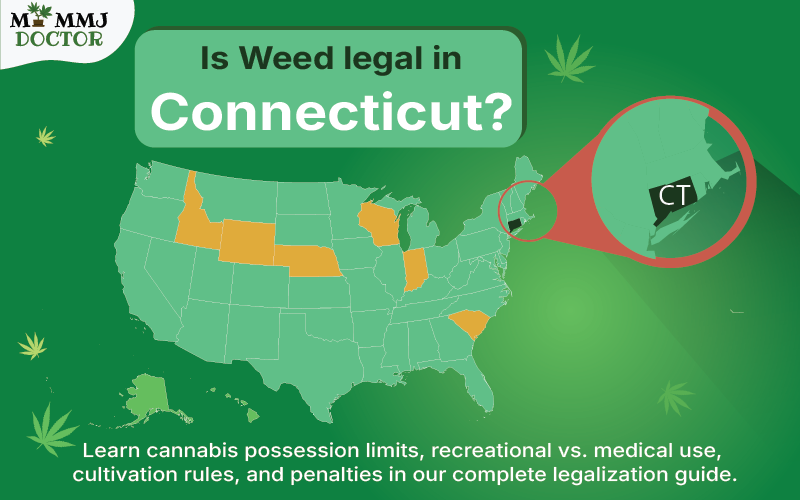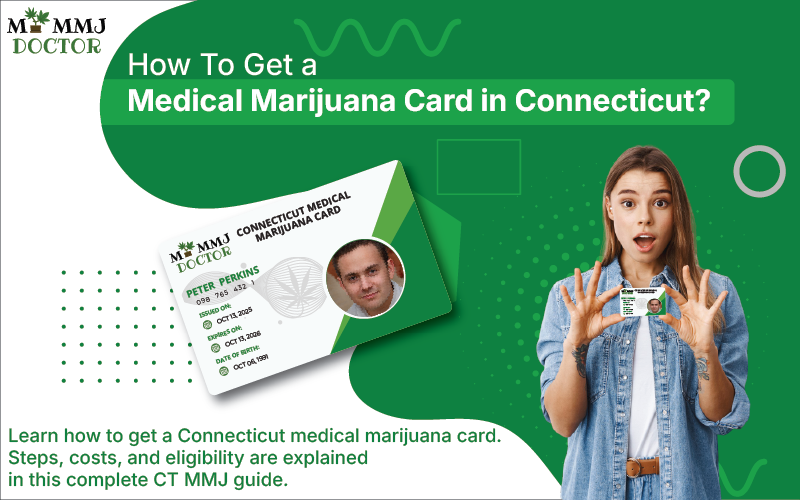Apply Online for Your Connecticut Medical Marijuana Card Today
Quick When It Counts, Fair When It Matters, and Trusted All the Way.
HIPAA Compliant
Same-Day Approval
24/7 Online Assistance
★★★★★ 4.9/5 rating from thousands of happy patients.
GET APPROVED TODAY
$149 total Consultation Fee: $149 + State Fee: $0 *with financing options
How Can You Apply for a Connecticut Medical Marijuana Card Online?
Experience safe, legal, and trusted medical marijuana guidance from certified healthcare professionals in just 3 easy steps. We make the process convenient, reliable, and tailored to your health needs and well-being.

Fill out a short application form
Submit your photo, upload your ID, share a few health details, and you’re done in just minutes, for only $149.

Talk to our certified doctor
Get expert medical marijuana guidance with a full health evaluation from our licensed doctors under HIPAA guidelines.

Receive your certificate
Get approved and access your CT medical marijuana card via email within 24 hours, and proceed with state registration.
Here’s How It All Works
Watch the video for a clear step-by-step guide to the Connecticut medical marijuana card application process. Discover how easy it is to get your medical marijuana recommendation in Connecticut with us.
2 minute overview video
Don’t Overpay, Choose Us
Save your money without compromising on care.
| Provider | New MMJ Card | Renewal Price | Key Features | Notes |
|---|---|---|---|---|
| My MMJ Doctor BEST VALUE | $149 | $129 |
|
Best Value & Service |
| Others | $299 | $199 |
|
Higher Costs, Longer Wait |
- ✅Fast Approval
- ✅Licensed Doctors
- ✅24/7 Support
- ✅Money-Back Guarantee
- ✅Same-Day Service
- ❌Standard Processing
- ❌Limited Support
- ❌No Guarantee
- ❌2-3 Day Wait
- ❌Basic Service
Benefits of a CT Medical Marijuana Card
Get preferential advantages with a Connecticut medical marijuana card. The benefits include legal protection, money-saving, and accurate health guidance regarding medical marijuana dosage.

Legal Protection

Possession Limit
Possess up to 5 ounces of medical marijuana, which is significantly above the 1.5 ounce recreational limit.

Exclusive Access
Access more strains, diverse THC/CBD ratios, and exclusive high-potency products like edibles, flowers, tinctures, etc.,

Tax Benefits

Home Cultivation
Have freedom to grow up to 6 cannabis plants per patient (12 per household), all indoors and out of public view.

Job Protection
Provides employment protections under PUMA, shielding patients and caregivers from workplace discrimination.
Why Wait to Enjoy these Benefits that You Deserve?
Thousands of Connecticut patients are already enjoying the benefits and advantages of a medical marijuana card.
Now, it’s your turn to experience better health and lasting relief.
Transparent Pricing with Trusted Service
All-inclusive flat fee, zero hidden costs, and a 100% money-back guarantee if you’re not approved for your Connecticut medical marijuana card. We make medical guidance simple, personal, and stress-free.
New MMJ Card
MOST POPULAR
✅ Licensed CT Doctor Consultation
✅Same-Day Approval
✅Digital Certificate
✅HIPAA-Compliant Process
✅100% Money-Back Guarantee
✅24/7 Customer Support
Card Renewal
✅ Quick Renewal Process
✅ Licensed CT Doctor Review
✅ Same-Day Processing
✅ Updated Digital Certificate
✅ Continued Legal Protection
✅ Priority Customer Support

Money-Back Guarantee
Get a 100% refund if you are not approved

Same-Day Approval
Receive MMJ certificate within 24 hours

Licensed CT Doctors
Get 24/7 assistance from a certified professional
What Makes My MMJ Doctor the Right Choice

Trusted Licensed Doctors
Get the most accurate medical cannabis recommendation, which is in your best interest, from a licensed health provider.

Same-Day Certification
Get evaluated and certified within 24 hours for fast, legal, and reliable access to cannabis treatment when you need it most.

Refund Policy
Gain confidence with our 100% money-back guarantee. If our healthcare professional doesn’t approve you, you pay nothing.

Effortless Accessibility
Get trusted cannabis recommendations and legal certification for medical marijuana from anywhere, in both urban and remote areas.

Exceptional Privacy
HIPAA-compliant virtual consultations with licensed doctors, private and judgment-free, from the comfort of your home.

24/7 Customer Support
Availability of real people online for assistance, for you to reach out with your queries anytime for a quick and assured response.
Why We Are Connecticut #1 Choice for MMJ Recommendations?
Patients Served
%
Approval Rate
Customer Rating
Real Stories, Real Trust
Discover genuine patient testimonials that reflect our commitment to privacy, professionalism, and seamless
CT MMJ certification.
Frequently Asked Questions
Find clear answers to the most common questions about getting your Connecticut medical marijuana card, from eligibility to costs, renewals, and more.
How do I apply for the state program in Connecticut?
Can I apply for my medical marijuana card online in Connecticut?
How often do I need to renew my Connecticut medical marijuana card?
Connecticut medical marijuana cards are valid for one year. Renew annually by completing physician recertification at just $129, updating your Biznet account, and submitting the required documentation to the state. My MMJ Doctor offers full renewal services for $129, including recertification and a re-evaluation of your health. Book your consultation today and get approved.
How long does it take to get a medical marijuana card in CT?
How do I qualify for a Connecticut medical cannabis card?
How much can I buy from a dispensary at a time in CT?
In Connecticut, registered medical marijuana patients may purchase up to 5 ounces per month from licensed dispensaries. There are no individual transaction limits for medical patients. The purchases are tracked in the state’s system to ensure compliance with the monthly limit.
Can I use my Connecticut medical marijuana card in other states?
Connecticut does not show reciprocity, which means it does not recognize out-of-state medical marijuana cards. To know that a Connecticut card is accepted in another state, always check that state’s laws and regulations before attempting any cannabis purchase.
Can I go to a dispensary without a medical card in CT?
Can I get fired for having a medical marijuana card in Connecticut?
Can I have a gun permit and a medical card in CT?
No, you cannot hold both a Connecticut gun permit and a medical marijuana card, as federal law prohibits firearm possession by marijuana users.
What are the qualifying conditions for a CT medical marijuana card?
Neurological / Neuromuscular:
Parkinson’s Disease, Multiple Sclerosis, Epilepsy / Uncontrolled Seizures, Cerebral Palsy, Muscular Dystrophy, ALS, Spinal Cord Injury with Intractable Spasticity, Tourette Syndrome, Movement Disorders from Huntington’s Disease
Chronic Pain / Inflammation:
Severe Rheumatoid Arthritis, Fibromyalgia, Chronic Neuropathic Pain, Complex Regional Pain Syndrome (Type 1 & 2), Degenerative Spinal Disorders, Post-Laminectomy Syndrome, Post-Herpetic Neuralgia
Gastrointestinal / Metabolic:
Crohn’s Disease, Ulcerative Colitis, Chronic Pancreatitis, Cachexia / Wasting Syndrome, Interstitial Cystitis, Median Arcuate Ligament Syndrome (MALS)
Skin / Musculoskeletal:
Severe Psoriasis & Psoriatic Arthritis, Osteogenesis Imperfecta
Mental Health / Other Conditions:
PTSD, Autism Spectrum Disorder, Female Orgasmic Difficulty/Disorder
Terminal / Life-Limiting Conditions:
Cancer, HIV/AIDS, Terminal Illness Requiring End-of-Life Care
Other Conditions:
Glaucoma, Neuropathic Facial Pain, Intractable Headache Syndromes, Hydrocephalus with Intractable Headache, Vulvodynia / Vulvar Burning
Note:If your condition isn’t listed but you believe medical marijuana could help, you can petition the Board of Physicians for approval.
Your Trusted Guide to the latest Connecticut Updates
Is Weed Legal in Connecticut? Here is the cannabis legalization guide
Learn cannabis possession limits, recreational vs. medical use, cultivation rules, and penalties in our complete legalization guide.
04/08/2025
How To Get a Medical Marijuana Card in Connecticut?
Learn how to get a Connecticut medical marijuana card. Steps, costs, and eligibility are explained in this complete CT MMJ guide.
01/09/2025
Learn about Connecticut Medical marijuana laws in 2025
Find out patient rights, possession limits, cultivation rules, and how to stay compliant with CT cannabis regulations.
03/07/2025
Consult with Our Connecticut Medical Marijuana Expert Today
Start your safe and legal medical marijuana journey today. Join thousands of Connecticut patients healing better with their medical conditions with our trusted cannabis card and approvals.
Call Us Now
Email Support
Live Chat
24/7 customer support, just a click away.






